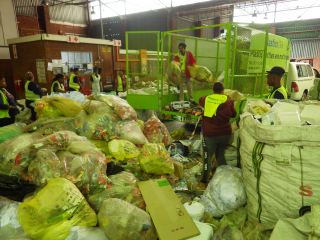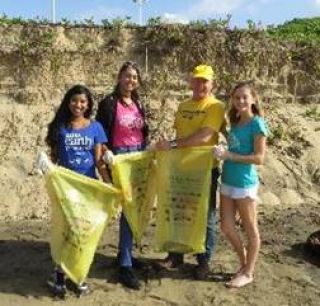Waste Management and Route Cleaning at 2018 MTB Challenge and Cape Cycle Race
A dedicated Plastics|SA clean-up team consisting of more than 100 workers employed from informal settlements around Cape Town, once again worked tirelessly to ensure the race routes used for the recent 2018 Cape Town Cycle Tour and Mountain Bike Challenge were kept clean and litter-free.
Under the guidance of John Kieser, Sustainability Manager of Plastics|SA, this was the 11th consecutive year that the team was responsible for the area cleansing and waste management of the road race and the 7th year that they were also given responsibility for the Mountain Bike Challenge.
“I think we can rightly say that this clean-up crew should be considered race veterans by now and that they have an intimate knowledge of every hill, valley, twist and turn of the routes,” Kieser says.
The primary goal of the clean-up crews is to ensure that the waste generated and left behind by cyclists and spectators on race days, is collected as quickly and efficiently as possible. Besides ensuring minimal disruption to other cyclists and traffic, the waste is also removed and recycled in line with the overall goals of the environmental policies of the areas impacted by the sport events.
Less water, more energy sachets
Owing to the water shortage in Cape Town, cyclists used more energy drinks in multi-layered sachets (known as “Gue”). Kieser reports that the littering of this material was notably larger than in previous years. As a result, their final sweep of the race route on the Monday after the Cycle Tour, took much longer than usual.
Raising awareness of litter and the importance of recycling
“The active and visible involvement of the Plastics|SA clean-up team and the red PETCO-branded bins and truck at these annual events are most certainly helping to create an awareness of the mountains of litter generated at big events such as these and the importance of recycling,” Kieser said.
With the support of waste management company WastePlan, more than 10 truckloads of waste consisting mainly of energy drink sachets and other high value plastic waste was collected and removed for recycling.
“We are deeply thankful that we experienced favourable weather conditions this year, and for the organisers and sponsors who provided funding, clothing and food parcels for the clean-up teams. It is always a pleasure working with a team such as this, which has to operate under great stress. A wonderful atmosphere was experienced along the way and we all felt that we had the privilege of being part of something truly wonderful,” Kieser concluded.
For more information, please visit www.plasticsinfo.co.zaThe Plastics SA clean-up crews will again be in action at the Old Mutual Two Oceans Marathon (OMTOM) that will be taking place on 31 March 2018
SA PLASTICS INDUSTRY LAUNCHES OPERATION CLEAN SWEEP
The South African plastics industry recently launched Operation Clean Sweep on World Oceans Day (8 June 2017) at the uShaka Marine World, Durban.
According to Douw Steyn, Sustainability Director at Plastics|SA, the primary goal of the campaign is to stop plastic pellets, flakes and powder used in the plastics industry, from reaching the sea.
“We as the plastics industry produce the pellets and flakes used to manufacture plastic bags, bottles and other plastic products. When these micro-plastics are spilt during the manufacturing process, they are swept into drains from where they enter the sewerage system and eventually end up in our rivers and ultimately the sea. These pellets are smaller than a sunflower seed, therefore not easy to pick up during regular beach clean-ups. As a result, they are ingested by turtles, birds and marine life," Steyn explains.
Mark Liptrot, Sustainability Manager at the packaging company, Constantia Afripak, said the extended effect of plastics on the ocean is a growing problem as micro-plastics attract chemical pollutants that are ingested by marine life, which, in turn, is eaten by other marine animals.
Addressing the media, industry and members of the public who attended the breakfast launch, Steyn emphasised that plastics are integral to every aspect of our lives, particularly in protecting food from contamination.
“It is where we use it, how we use it and what we do with the plastic product once we are done with it,that is important. To address this problem and offer a workable solution, Plastics|SA launched “Operation Clean Sweep” - a worldwide drive aimed at reducing the amount of plastic pellets that end up in rivers and ultimately in the ocean”, Steyn said.
He added that the plastics industry as a whole had a role to play –from the producers and importers of raw materials pellets and flakes, to the converters and manufacturers of plastic products, as well as the recycling companies.
"Our goal is to achieve zero pellet, flake, and powder loss. Whilst it might seem to be an ambitious target, we believe it is possible through containment and the implementation of good housekeeping practices,” he said.
Catherine Constantinides, head of Miss Earth South Africa endorsed Operation Clean Sweep. “To help highlight the importance of clean oceans, Miss Earth SA ambassadors took part in 100 beach clean-ups across the country. But it's not just cleaning up that's important. Educating and creating awareness are equally necessary. If we don’t educate, we will be doing clean-ups for the next 20 years of World Ocean Day. We are appealing to retailers and the public at large to realise that they too have a vital role to play in ensuring that plastic products and waste do not end up polluting the environment," Constantinides implored.
Notes to the editor:
World Oceans Day Background:
The Ocean Project has promoted and coordinated World Oceans Day globally since 2002. We do so with a team based in the US and also advisors and volunteers in dozens of countries. We are a collaborative organization and work in partnership with hundreds of organizations, including World Ocean Network, the Association of Zoos and Aquariums, and many other networks from all sectors. Thank you to the Government of Canada for proposing the concept of a World Ocean Day, at the Earth Summit in Rio de Janeiro in 1992, and to the United Nations for officially recognizing 8 June as World Oceans Day, since late 2008. World Oceans Day® is trademarked to protect it from those who might have commercial or counterproductive interests. All information, materials and resources on this site and associated with World Oceans Day are free to use to those who are celebrating World Oceans Day as a way to bring about a healthier ocean and a better future.
World Oceans Day is celebrated around the world in cities and rural villages, close to the sea and far inland. In fact, over 600 events were hosted around the world last year.
ENDS



